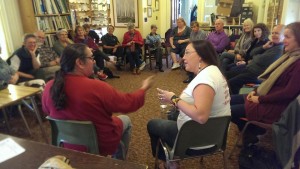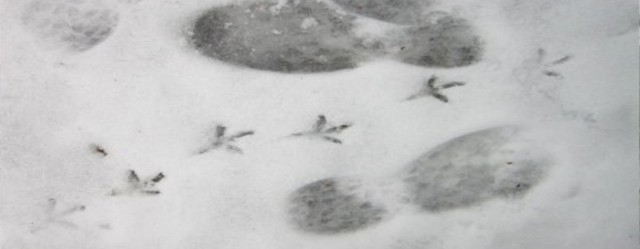 In a time of devastating climate change, we face a powerful lobby that wants to extend the dirty fossil fuel industry of the past in our province. More troublesome than the oil and gas of yesteryear is what is known as extreme energy like fracking for shale gas and transporting bitumen through pipelines that traverse our precious rivers and streams. We are heartened by the brave people in this province who are taking a stand for our environment, some for the first time in their lives. We hope to honour the new friendships and alliances made with New Brunswickers from different backgrounds, indigenous defenders of the land, Anglophone and Acadian communities, unionists and workers, farmers, doctors and other professionals by amplifying their voices that say no to extreme energy and yes to a future that not only protects and restores our beloved lands and waters but also creates and maintains meaningful jobs and local economies that respect the limits of nature.
In a time of devastating climate change, we face a powerful lobby that wants to extend the dirty fossil fuel industry of the past in our province. More troublesome than the oil and gas of yesteryear is what is known as extreme energy like fracking for shale gas and transporting bitumen through pipelines that traverse our precious rivers and streams. We are heartened by the brave people in this province who are taking a stand for our environment, some for the first time in their lives. We hope to honour the new friendships and alliances made with New Brunswickers from different backgrounds, indigenous defenders of the land, Anglophone and Acadian communities, unionists and workers, farmers, doctors and other professionals by amplifying their voices that say no to extreme energy and yes to a future that not only protects and restores our beloved lands and waters but also creates and maintains meaningful jobs and local economies that respect the limits of nature.
As we get ready for 2014, we ask that you join New Brunswickers across the province in making a donation that supports the important work of the Conservation Council of New Brunswick.
Many people in the world struggle to get enough water to live until the next day. We are blessed with some of the best water on the planet, and we want to make sure that it stays that way! We want our kids to go outside and experience nature so they can grow up healthy; we want the oceans to sustain life; and we want the forests to produce oxygen, be healthy habitat for wildlife and give us joy and calm.
Stephanie Merrill, our Freshwater Protection Program Director, continues to act as a trusted and sought after resource person on the impacts of shale gas, analyzing water and energy policies, producing informative factsheets and sharing her knowledge at town hall meetings and in university classrooms. Stephanie is also mapping public access points on the Wolastoq, also known as the Saint John River, encouraging stronger regulations that protect wetlands, collaborating with the Nashwaak Watershed Association to develop the Nashwaak River Greenway and disseminating information to the public about the potential effects of a proposed open-pit molybdenum and tungsten mine near Stanley on the Nashwaak watershed.
Our Fundy Baykeeper Matt Abbott celebrated a tremendous victory this year with the elimination of a barrier in the St. Croix River, allowing the gaspereau (alewives) to return to the river to spawn. This success was a result of collaboration with the Passamaquoddy people and groups on both sides of the international border. Matt hosted another successful Musquash Paddle in August, with 90 participants in kayaks and canoes enjoying the Musquash Estuary and Bay of Fundy. He witnessed and wrote about the successful prosecution of Cooke Aquaculture for illegal use of pesticides in the Fundy Bay, which led to the death of lobsters in traps and crates. He and Inka Milewski, our Science Advisor, have been assisting coastal communities in Nova Scotia to analyze the impacts of the aquaculture industry there. Inka, a marine biologist, has been sampling the sea bottom floor of Shelburne Harbour. Her findings reveal that life on the sea bottom does not quickly come back after it has experienced aquaculture.
Tracy Glynn, CCNB’s Forest Program Director, continues to draw attention and build alliances with scientists to end the perverse use of herbicides on our Acadian mixedwood forest.
The Conservation Council’s No Child Left Inside program continues to grow under Nadine Ives’ coordination. Nadine is working with the Keswick Ridge School’s principal, teachers, students and their parents on outside learning initiatives like the posting of informative signs along woodlands trails and the planting of gardens that feed our pollinators, bees and butterflies. She hopes to expand these initiatives in other schools in the coming year.
Kevin Matthews continues to work with the Renewables NB hub, promoting energy efficiency and renewable energy in our province. Kevin produced an important documentary of inspiring energy efficiency and conservation projects underway here in New Brunswick. The film screened at the NB Film Co-op’s popular Silver Wave Film Festival in Fredericton in November.
The Conservation Council of New Brunswick will be 45 years old in 2014. Over the decades of our existence, we have built on our legacy of being New Brunswick’s voice for the environment, standing on the shoulders of thoughtful giants who laid a strong foundation for an environmental movement. Premier David Alward paid us a compliment last month when he said that the history of environmental activism is very “deep and long-standing in New Brunswick.” It is your continued support that has made our strong voice for the environment possible.
We have learned the importance of adapting to meet new threats to our environment. When a chill was put on environmental charities, we grew a not-for-profit arm, CCNB Action, in 2011 so that we could carry out what is considered political work like issuing calls to action to support sound legislation. Upon careful study and reflection this year, we decided to move our membership from CCNB Action back to the Conservation Council, a decision approved by our membership at our Annual General Meeting in October. CCNB Action will continue to exist and do complementary political activities. Donations to the Conservation Council will receive charitable receipts. CCNB Action, a not-profit, cannot issue tax receipts for donations. To donate, you can send a cheque in the name of the organization that you wish to support, Conservation Council or CCNB Action, to 180 Saint John St., Fredericton, NB E3B 4A9 or visit our donate page on our website.
Please consider donating to the Conservation Council at a time when our environment needs us more than ever.
We greatly appreciate your generous support over the years.

